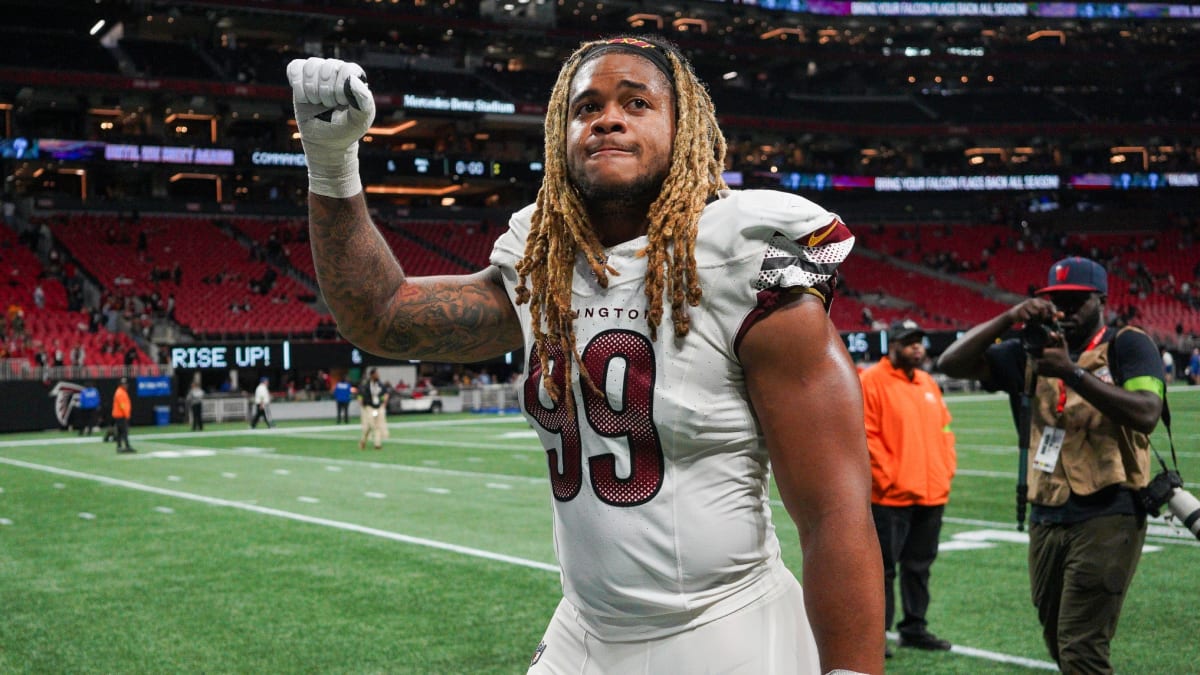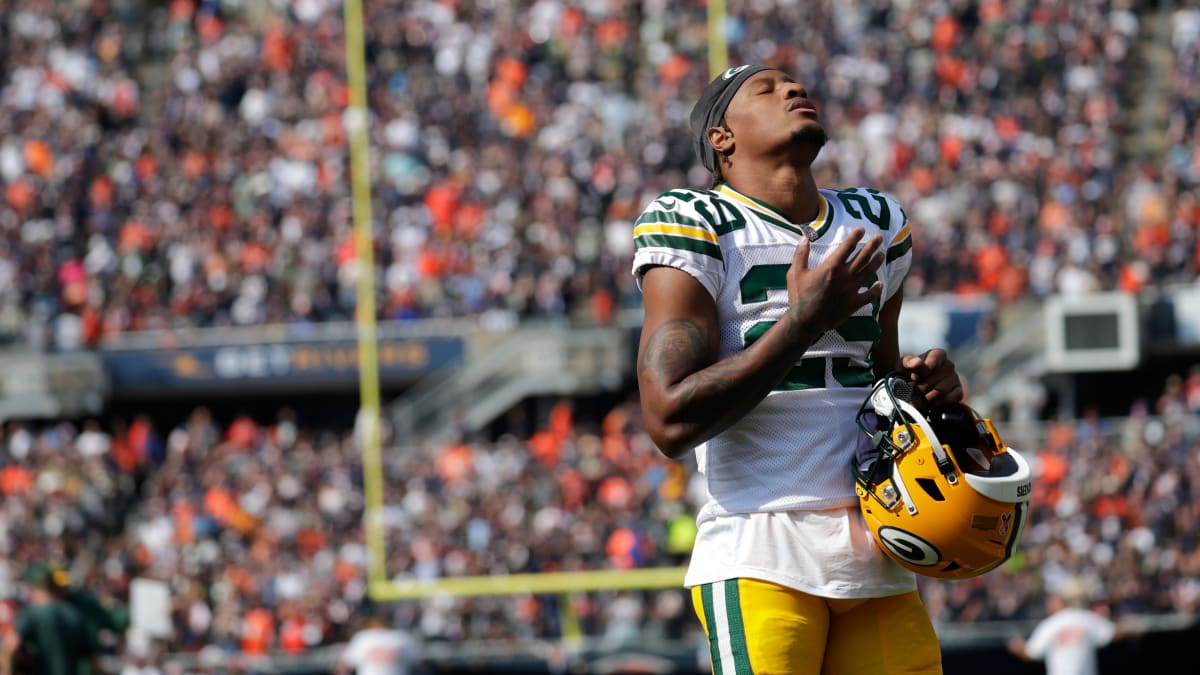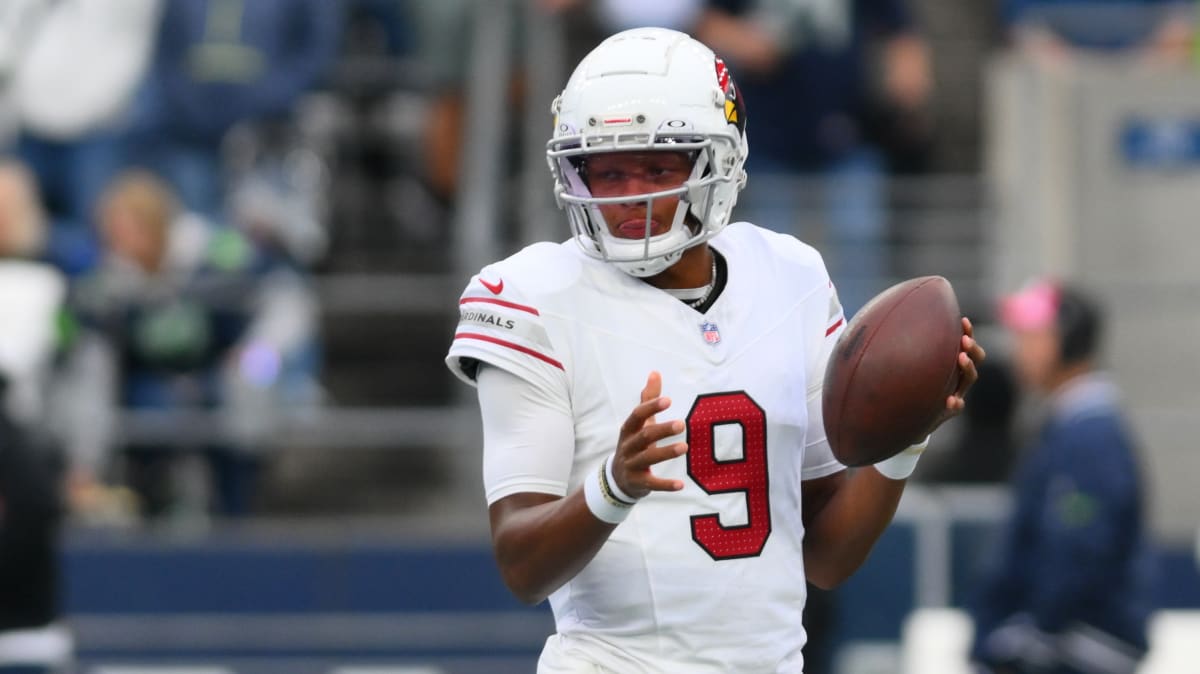Trade deadline has come and gone, and we’re picking up the pieces …
• The 49ers have become a model franchise in a lot of ways, and one is how they’ve been able to develop young coaches and executives. And there’s been a benefit on the other end of it (one that other teams, most prominently Carolina, have started to pursue) that pays off at times like this.
Thanks to Robert Saleh, Martin Mayhew, Mike McDaniel, DeMeco Ryans and Ran Carthon getting head coaching and general manager jobs—and through the NFL’s system for rewarding teams who develop diverse candidates into those positions—San Francisco has amassed a raft of compensatory third-round picks. Thus far, they’ve used those picks on cornerback Ambry Thomas, receiver Danny Gray, kicker Jake Moody, tight end Cameron Latu and in trades up for Trey Lance in 2021 and J’Ayir Brown in ‘23.

Brett Davis/USA TODAY Sports
Now, they’ll send one to the Commanders for Chase Young. And the really wild thing here is that if Young plays great, they either keep him, or let him walk in free agency and get a third-round comp pick back in 2025 (which would essentially mean they got a half-a-season and potential Super Bowl run with Young for moving a comp pick back a year).
As for what the Niners are getting, Young’s played really well thus far this year, but the reason he didn’t draw more interest on the market was because of health—and, in particular, concerns following the catastrophic knee injury he suffered two years ago. But this is still a guy who was Defensive Rookie of the Year in 2020, and is as physically talented as any pass rusher in the league.
Playing next to his old college teammate Nick Bosa—as well as Arik Armstead and Javon Hargrave—and for widely-respected defensive line coach Kris Kocurek, should help bring the best out in Young. And make the Niners front a nightmare to deal with.
• The presence of new Commanders owner Josh Harris seemed to have a clear impact on how Washington did business on Tuesday. From a long-term perspective, it made sense to try and get what the Commanders could for Young and fellow edge-rusher Montez Sweat. But right now, the shot-callers on the football side of that building are fighting for their jobs. So the fact that both Young and Sweat were offloaded is interesting.
Also, Harris runs the 76ers with a strong analytics influence, and that would explain an effort to build up assets off of expiring contracts, with second- and third-rounders coming back for Sweat and Young, respectively. The team also listened to calls about (and asked for a later-round pick for) Jacoby Brissett, which mirrored their ask on the pass-rushers.
For what it’s worth, Harris’s new analytics chief, Eugene Shen, reports to work next week, which is the first big hire the owner has made on the football side since being approved back in the summer.
• The Bears’ decision to spend what will likely be a pick in the 30s to get Sweat looks a little weird on the surface, but, football-wise, it does make sense. Sweat is still just 27, and the chances of getting a pass-rusher of his ilk with a pick in the 30s, or finding one like him in free agency, are very, very small. So this is a way of getting ahead of a need, and also getting help now (Carolina’s Brian Burns, for example, would cost a lot more in a trade off the franchise tag in March, and that’s if the Panthers even make him available).
The problem, though, is that Sweat’s not signed beyond this season. Yes, you have the franchise tag. But Young now has the leverage that Laremy Tunsil did in Houston after he was traded or there, or Jalen Ramsey did in Los Angeles after the Rams traded for him. But at least in those cases, the teams acquiring Tunsil and Ramsey had an extra year left on the contract, which gave them some time and control.
If Sweat gets signed and plays great, of course, the rest is moot. But there’s a lot of pressure on GM Ryan Poles to get this right after striking out badly on a similar type of trade to get Chase Claypool a little over a year ago.

Dan Powers/USA TODAY NETWORK
• I really like how the Bills added a plug-and-play veteran corner, Rasul Douglas, to ease the blow of Tre’Davious White’s torn Achilles. Douglas is still just 28, has another year on an affordable contract and should be a steadying force for a defense that’s gone through a dizzying number of injuries through the first eight weeks of this season.
The price, of course, was significant. But in trading a third-rounder for Douglas and a fifth-rounder, what we’re really talking about here is moving a single pick down 70 or so slots. Which, given where Buffalo is as a team, is fully worth it.
• The Seahawks really did look at a lot of different options before trading for Giants defensive lineman Leonard Williams, who’s a big, reliable, disruptive piece for their defensive front. And much of their efforts had been focused on edge-rushers, with talks going pretty deep on players like New England’s Josh Uche. What Williams brings that’s a little different is that he can be a true three-down player for a Seattle defense that’s already got plenty of horses.

Steven Bisig/USA TODAY Sports
• The Vikings did investigate a number of different options for a new quarterback. Ultimately, the price for Josh Dobbs—he came with a conditional seventh-round pick, as Minnesota sent a sixth-rounder to Arizona—was right. Remember, the team has reset a lot of things this year, eating dead cap dollars and shedding aging veterans, so the whole idea has been to go into 2024 with clean books and a full complement of assets. So spending a late pick on someone like Brissett wouldn’t have made a ton of sense.
• The Patriots decided to stand pat with their young contract-year guys Uche, Kyle Dugger and Mike Onwenu. But they did listen. And ultimately, this came down to the team making a decision against dealing off good players for marginal draft capital. Also, for what it’s worth, no one called on Mac Jones or Ezekiel Ellliott.
• Silence from New England, Carolina and Denver reflects, to me, a very short supply of buyers this year. I’ll dig this week into why it played out that way, because there were opportunities out there for teams that wanted to take a swing or two. In the end, there simply wasn’t a great appetite on the part of contenders to pick up the bat.







